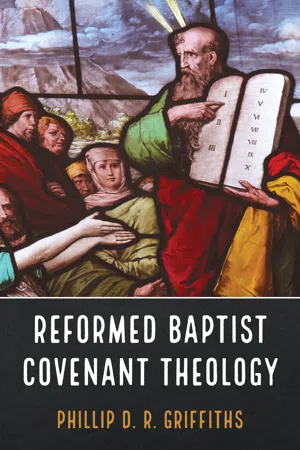
- 160 pages
- English
- ePUB (mobile friendly)
- Available on iOS & Android
Reformed Baptist Covenant Theology
About This Book
God's covenants form the backbone of the Scriptures. Understanding these covenants is the key to unlocking the treasures that lay therein. This book will enable the reader, not only to appreciate redemptive history, but to understand more fully his/her position in Christ. Griffiths demonstrates the essential fact that there has always been one Church, one way of salvation, and that all have been, are being, and will be saved only through faith in Christ.Griffiths eschews the Presbyterian paradigm which believes the Abrahamic, Mosaic, and Davidic covenants to be of the same substance as the new covenant, only differing in regard to their administration. Replacing it with essential truth that the new covenant, which is the outworking of the eternal covenant of redemption in time, is the only covenant of grace. Both Old and New Testament believers come under the mediatorship of Christ and are members and recipients of new covenant blessings.The author shows how all other covenants, what he calls "subsidiary covenants, " are of works, and that their function is to magnify the covenant of grace, i.e., the new covenant.
Frequently asked questions
Information
What is a Covenant
The Plight of Humanity Under the First Man
Table of contents
- Title Page
- Introduction
- Chapter 1: What is a Covenant
- Chapter 2: The Plight of Humanity Under the First Man
- Chapter 3: Redemption through the Second Adam
- Chapter 4: The New Covenant in the Old Testament
- Chapter 5: Application of New Covenant Before Abraham
- Chapter 6: Promissory Covenant with Abraham
- Chapter 7: The Covenant of Circumcision
- Chapter 8: Abraham’s Double Capacity
- Chapter 9: The Sinaitic Covenant
- Chapter 10: The Davidic Covenant
- Chapter 11: Circumcision and Baptism?
- Chapter 12: The Distinguishing Factor
- Conclusion
- Bibliography